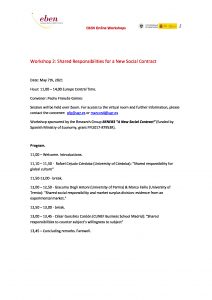Workshop 2: Shared Responsibilities for a New Social Contract
Date: May 7th, 2021
Hour: 11:00 – 14:00 Europe Central Time.
Convener: Pedro Francés-Gómez
Session will be held over Zoom. For access to the virtual room and further information, please contact the convener: pfg@ugr.es or marcon4@ugr.es
Workshop sponsored by the Research Group BENEB3 “A New Social Contract” (funded by Spanish Ministry of Economy, grant FFI2017-87953R).
Program
11:00 – Welcome. Introductions.
11:10 – 11:50 – Rafael Cejudo-Córdoba (University of Córdoba): “Shared responsibility for global culture”
11:50-12:00 – break.
12:00 – 12:50 – Giacomo Degli Antoni (University of Parma) & Marco Faillo (University of Trento): “Shared social responsibility and market surplus division: evidence from an experimental market.”
12:50 – 13:30 – César González Cantón (CUNEF Business School Madrid): “Shared responsibilities to counter subject’s willingness to subject”
13:30 – 14:00 Mini Lunch Break
14:00 – 14:45 – Roundtable wrap-up session led by Lorenzo Sacconi (University of Milan): “Shared Social Responsibility; the post-pandemic context”
Workshop proposed by the Research Group BENEB3 “A New Social Contract” (funded by Spanish Ministry of Economy, grant FFI2017-87953R).
Justification
The policy about CSR in the EU has steered towards the goal of sustainability. The European Commission and key actors in the promotion of an ethical economy have come to understand that the challenges ahead require going beyond the idea of corporate responsibilities as stakeholder management, not to mention mere philanthropy. The EU has launched the project of a Green Deal and made it its number one priority. In a very recent address of President Von der Leyen, she said the following:
“The pandemic is an opportunity to rethink how we want to live together and how we want to deal with nature. We have to better respect the boundaries of our planet. Tackling climate change and caring for our environment requires us to rethink the way we live. That is why the EU has made the European Green Deal a priority.”
A Green Deal for Europe needs to involve not only corporate actors –even if they have more pressing responsibilities given their power and social impacts– but the whole of society. In order to achieve a fair transition towards a circular sustainable economy we must assume our own responsibilities as consumers, workers, elected officials, and ordinary citizens. Many consumer habits must change; many public agencies’ priorities re-aligned; many corporate strategies re-thought.
In this context, we invite a discussion about the notion of “shared responsibility.” The idea behind this concept is that deep social changes cannot be expected to derive from the initiative of a single social actor, be it corporations, governments or supra-national agencies. On the contrary, they depend on actions and messages from different levels, so that mutual expectations are generated that push for changes.
This workshop aims to discuss this important topic from the point of view of its philosophical underpinnings as well as from an applied, economic, organizational and strategic perspective.
The topics of the expected contribution include –but are not limited to– the following:
- The epistemic and practical conditions –collective knowledge and collective agency– for joint action and shared responsibility.
- The role of moral principles in creating the conditions for joint action.
- The relationship between “group agency” and the notion of shared responsibility.
- The role and forms of democratic governance.
- How do social norms shape collective action; and how can they be changed.
- The role of co-operative companies and social economy in general in defining a new paradigm for shared responsibility.
- Particular cases of shared or extended responsibilities through the study of finance, labor markets, working conditions, human rights protection, and other applied contexts where it is possible to explore the nature and effect of socially shared responsibilities through empirical data.

